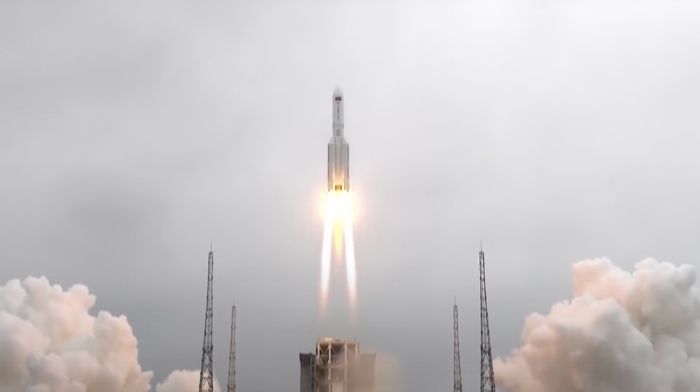
A large rocket from China is about to make an uncontrolled reentry back into the atmosphere of Earth. Experts are unsure at this time where exactly the debris from it will land.
‘Unpredictably’ Plummeting Back To Earth
SpaceNews reported that China’s Long March 5B rocket is “unpredictably” plummeting back to Earth after it launched off of the new T-shaped Chinese space station last Thursday.
The 22.5-metric-ton Tianhe space station module is orbiting as it should be after separating from the core stage of the rocket.
“It will be one of the largest instances of uncontrolled reentry of a spacecraft and could potentially land on an inhabited area,” reported SpaceNews.
Related: NYPD Release Video Of Brutal Chinatown Attack – Victim Beaten And Stripped
‘It’s Potentially Not Good’
“It’s potentially not good,” Jonathan McDowell, Astrophysicist at the Astrophysics Center at Harvard University, told The Guardian.
“Last time they launched a Long March 5B rocket they ended up with big long rods of metal flying through the sky and damaging several buildings in the Ivory Coast,” he continued. “Most of it burned up, but there were these enormous pieces of metal that hit the ground. We are very lucky no one was hurt.”
He added that some of the pieces that will likely survive re-entry would be the “equivalent of a small plane crash scattered over 100 miles.”
Given the fact that Earth’s oceans cover 70 percent of the planet, it is likely to fall in an uninhabited area.
However, there is no way to know at this time if the rocket will instead fall in an area that humans do indeed inhabit.
This could be catastrophic, as McDowell said that any rocket pieces that survive re-entry would be the “equivalent of a small plane crash scattered over 100 miles.”
Experts Don’t Know Where Debris Will Land
Experts have difficulty assessing the trajectory of where the rocket stage will fall at this time. There are many uncertain factors as to what will happen when it reenters the atmosphere.
Since Earth’s atmosphere expands or contracts based on solar activity, it’s difficult to know when and how the rocket stage will eventually fall to Earth’s surface.
“The high speed of the rocket body means it orbits the Earth roughly every 90 minutes and so a change of just a few minutes in reentry time results in reentry point thousands of kilometers away,” SpaceNews explained.
Since 1990, nothing heavier than 10 tons has been deliberately left in orbit to re-enter uncontrolled.
Related: Hate Crime? Attack In Catholic Church Caught On Video
The publication added that the rocket stage’s orbital inclination of 41.5 degrees means it “passes a little farther north than New York, Madrid and Beijing and as far south as southern Chile and Wellington, New Zealand, and could make its reentry at any point within this area.”
It’s expected to return to Earth on May 10, plus or minus two days.
